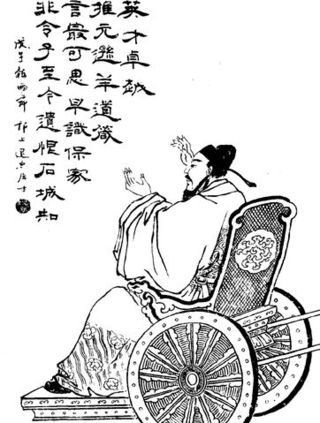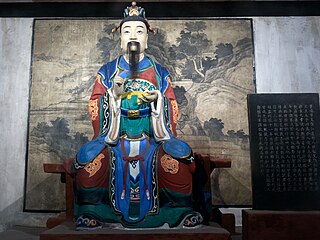Related Research Articles

Ding Feng,courtesy name Chengyuan,was a Chinese military general and politician of the state of Eastern Wu during the Three Kingdoms period of China.

Zhuge Dan,courtesy name Gongxiu,was a Chinese military general and politician of the state of Cao Wei during the Three Kingdoms period of China. When he held key military appointments throughout his middle to late career,he was involved in all of the three rebellions which broke out in Shouchun between 251 and 258. During the second rebellion,he actively assisted the Wei regent Sima Shi in suppressing the revolt. After the rebellion,the Wei government put him in charge of Shouchun. As the Sima clan became more powerful and established themselves as the de facto rulers of Wei,Zhuge Dan feared that he would end up slain like Wang Ling and Guanqiu Jian –the leaders of the first two rebellions –so he started the third rebellion against Sima Zhao,who succeeded Sima Shi as regent of Wei in 255. Although he received some support from Wei's rival state Eastern Wu,his rebellion was eventually suppressed by Wei imperial forces and he met his end at the hands of Hu Fen,a military officer under Sima Zhao.

Zhuge Ke,courtesy name Yuanxun (元逊),was a Chinese military general and politician of the state of Eastern Wu during the Three Kingdoms period of China. He was the eldest son of Zhuge Jin,a military general who served under Wu's founding emperor,Sun Quan. After Sun Quan's death in 252,Zhuge Ke served as regent for Sun Quan's son and successor,Sun Liang,but the regency proved to be militarily disastrous due to Zhuge Ke's aggressive foreign policy towards Wu's rival state,Cao Wei. In 253,he was ousted from power in a coup d'état and killed along with his family.

Fei Yi,courtesy name Wenwei,was a Chinese diplomat,military general,politician,and regent of the state of Shu during the Three Kingdoms period of China. Born in the late Eastern Han dynasty,Fei Yi started his career as an attendant to Liu Shan,the eldest son and heir apparent of Liu Bei,a warlord who became the founding emperor of Shu. After Liu Shan became emperor in 223,Fei Yi gradually rose to prominence under the regency of Zhuge Liang,the Imperial Chancellor of Shu. During this time,he concurrently served as a military adviser under Zhuge Liang and as Shu's ambassador to its ally state Wu. He also played a significant role in the conflict between the Shu general Wei Yan and Zhuge Liang's chief clerk Yang Yi. After Zhuge Liang's death in 234,Fei Yi served as a deputy to the new regent Jiang Wan and progressively assumed greater responsibilities as Jiang Wan gradually relinquished his powers due to poor health. In 244,Fei Yi led Shu forces to victory at the Battle of Xingshi against their rival state Wei and succeeded Jiang Wan as regent of Shu two years later following the latter's death. On the first day of the Chinese New Year in 253,Fei Yi was assassinated by a Wei defector,Guo Xiu.
Sun He,courtesy name Zixiao,was an imperial prince of the state of Eastern Wu during the Three Kingdoms period of China. He was the third son of Sun Quan,the founding emperor of Wu. In 242,he became the crown prince after the death of his brother Sun Deng,the eldest son and first heir apparent of Sun Quan. In the 240s,a power struggle broke out between Sun He and his fourth brother,Sun Ba,over the succession to their father's throne. The conflict ended in 250 when Sun Quan forced Sun Ba to commit suicide,deposed Sun He and replaced him with Sun Liang. In 253,during Sun Liang's reign,the regent Sun Jun reduced Sun He to commoner status and forced him to commit suicide. In 264,one of Sun He's sons,Sun Hao,became the fourth emperor of Eastern Wu. After his coronation,Sun Hao honoured his father with the posthumous title Emperor Wen.
Quan Cong,courtesy name Zihuang,was a Chinese military general of the state of Eastern Wu during the Three Kingdoms period of China. Born in present-day Hangzhou towards the end of the Eastern Han dynasty,Quan Cong became famous at a young age when he performed acts of charity by giving grain to people suffering from famine and providing shelter to refugees from central China. He started his career under the warlord Sun Quan as a military officer and achieved success in his early career by pacifying the restive Shanyue tribes in the Jiangdong territories. After Sun Quan became an independent ruler of Wu in 222,Quan Cong rose to the rank of General and participated in battles against Wu's rival state Wei. He also pacified rebellions by local tribes in Danyang,Wu and Kuaiji commanderies. After Sun Quan became emperor in 229,Quan Cong married his daughter Sun Luban and became one of his most trusted generals. During this time,although he was less active in battles,he became more outspoken on state affairs. He strongly objected to Sun Quan's decision to let his heir apparent Sun Deng lead troops into battle because it was against traditions,and attempted to dissuade Sun Quan from launching an invasion of Zhuya and Yizhou. Towards the end of his life,he became embroiled in a power struggle between Sun Quan's sons Sun He and Sun Ba over the succession to their father's throne. Although he supported Sun Ba,he died before he could see the power struggle end in 250 with neither Sun He nor Sun Ba becoming the new heir apparent. Throughout his life,Quan Cong was known for being a respectful and agreeable man who remained humble despite his high social status and prestige. As a military commander,he was known for being courageous and decisive,and for conducting himself with dignity and often taking the bigger picture into consideration.
Wu Can,courtesy name Kongxiu,was an official of the state of Eastern Wu during the Three Kingdoms period of China.
Gu Tan,courtesy name Zimo,was an official of the state of Eastern Wu during the Three Kingdoms period of China.
Bu Zhi,courtesy name Zishan,was a Chinese military general and politician of the state of Eastern Wu during the Three Kingdoms period of China. Originally a scholar of humble background,he became a subordinate of the warlord Sun Quan in the late Eastern Han dynasty and gradually rose through the ranks. Between 210 and 220,he served as the governor of the remote and restive Jiao Province in southern China. During the Battle of Xiaoting/Yiling of 221–222,he quelled local uprisings in Sun Quan's territories in southern Jing Province and maintained peace in the area. After Sun Quan became emperor in 229,Bu Zhi oversaw the Wu armed forces guarding the Wu–Shu border at Xiling for about 20 years. During this time,he also gave advice to Sun Quan's first heir apparent,Sun Deng,and spoke up for officials affected by LüYi's abuses of power. In 246,he became the fourth Imperial Chancellor of Wu,but died in office in the following year.
Zhu Huan (177–238),courtesy name Xiumu,was a military general of the state of Eastern Wu during the Three Kingdoms period of China. Although he started his career early under the warlord Sun Quan,he did not receive any important responsibilities until after the Battle of Jiangling in 209. Since then,Zhu Huan had taken charge of some local defences and successfully quelled a few rebellions. Between 222 and 225,when Cao Pi,the emperor of Wu's rival state Wei,launched a three-pronged invasion of Wu,Sun Quan appointed Zhu Huan as a military commander to resist the Wei invaders. Zhu Huan defeated the Wei general Cao Ren at the Battle of Ruxu (222–223).
Zong Yu,courtesy name Deyan,was a military general and diplomat of the state of Shu Han during the Three Kingdoms period of China. Like Liao Hua and Zhang Yi,Zong was one of few officials who served the Shu-Han state throughout its entire existence.
The Battle of Dongxing,also known as the Battle of Dongguan,was fought from January to February 253 between the states of Cao Wei and Eastern Wu during the Three Kingdoms period of China. The battle concluded with a tactical victory for Wu.
Zhang Xiu,courtesy name Shusi,was a military general of the state of Eastern Wu during the Three Kingdoms period of China.
This article contains the family trees of members of the Sun clan,who ruled the state of Eastern Wu (229–280),in the Three Kingdoms period (220–280),in China.
Zhang Wen (193–230),courtesy name Huishu,was a Chinese military general and politician of the state of Eastern Wu during the Three Kingdoms period of China.
Liu Zan (183–255),courtesy name Zhengming,was a military general of the state of Eastern Wu during the Three Kingdoms period of China. He previously served under the warlord Sun Quan in the late Eastern Han dynasty.
Zhuge Rong,courtesy name Shuchang,was a military general of the state of Eastern Wu during the Three Kingdoms period of China. He was the third son of Zhuge Jin,a military general who served under Wu's founding emperor Sun Quan,and a younger brother of Zhuge Ke,a military general who briefly served as regent for Sun Quan's successor,Sun Liang.
Shi Ji,also known as Zhu Ji,courtesy name Gongxu,was a Chinese military general of the state of Eastern Wu during the Three Kingdoms period of China. He was the son of Zhu Ran,a general who served under Wu's founding emperor Sun Quan.
Gu Cheng,courtesy name Zizhi,was a military general of the state of Eastern Wu during the Three Kingdoms period of China.
The Battle of Fancheng was a military offensive launched in 241 by the state of Eastern Wu against its rival state,Cao Wei,during the Three Kingdoms period of China. The campaign was initiated by Wu's founding emperor,Sun Quan,two years after the death of the second Wei emperor,Cao Rui. The campaign ended with a decisive defeat for the Wu forces.
References
- ↑ (芍陂之役,拜奮威將軍...) Sanguozhi vol. 52.
- ↑ (芍陂之役,譚弟承及張休皆有功...) Zizhi Tongjian vol. 74.
- ↑ (春,吳人將伐魏。零陵太守殷札言於吳主曰:「今天棄曹氏,喪誅累見,虎爭之際而幼童涖事。陛下身自御戎,取亂侮亡,宜滌荊、揚之地,舉強羸之數,使強者執戟,羸者轉運。西命益州,軍于隴右,授諸葛瑾、朱然大衆,直指襄陽,陸遜、朱桓別征壽春,大駕入淮陽,歷青、徐。襄陽、壽春,困於受敵,長安以西,務禦蜀軍,許、洛之衆,勢必分離,掎角並進,民必內應。將帥對向,或失便宜,一軍敗績,則三軍離心;便當秣馬脂車,陵蹈城邑,乘勝逐北,以定華夏。若不悉軍動衆,循前輕舉,則不足大用,易於屢退,民疲威消,時往力竭,非上策也。」吳主不能用。) Zizhi Tongjian vol. 74.
- ↑ (先是,譚弟承與張休俱北征壽春,全琮時為大都督,與魏將王淩戰於芍陂,軍不利,魏兵乘勝陷沒五營將秦晃軍,休、承奮擊之。遂駐魏師。時琮羣子緒、端亦並為將,因敵旣住,乃進擊之,淩軍用退。) Sanguozhi vol. 52.
- ↑ (時論功行賞,以為駐敵之功大,退敵之功小,休、承並為雜號將軍,緒、端偏裨而已。寄父子益恨, ...) Sanguozhi vol. 52.
- ↑ (朝廷欲廣田畜穀於揚、豫之間,使尚書郎汝南鄧艾行陳、項以東至壽春。艾以為:「昔太祖破黃巾,因為屯田,積穀許都以制四方。今三隅已定,事在淮南,每大軍出征,運兵過半,功費巨億。陳、蔡之間,土下田良,可省許昌左右諸稻田,幷水東下,令淮北二萬人,淮南三萬人,什二分休,常有四萬人且田且守;益開河渠以增溉灌,通漕運。計除衆費,歲完五百萬斛以為軍資,六、七年間,可積二千萬斛於淮上,此則十萬之衆五年食也。以此乘吳,無不克矣。」太傅懿善之。是歲,始開廣漕渠,每東南有事,大興軍衆,汎舟而下,達于江、淮,資食有儲而無水害。) Zizhi Tongjian vol. 74.
- ↑ (四年秋九月,帝督諸軍擊諸葛恪, ... 軍次于舒,恪焚燒積聚,棄城而遁。) Jin Shu vol. 1.
- ↑ (吳諸葛恪遠遣諜人觀相徑要,欲圖壽春。太傅懿將兵入舒,欲以攻恪,吳主徙恪屯於柴桑。) Zizhi Tongjian vol. 74.
- ↑ (朱然攻樊,據與朱異破城外圍,還拜偏將軍,入補馬閑右部督,遷越騎校尉。) Sanguozhi vol. 56.
- ↑ (... 共構會譚。) Sanguozhi vol. 52.
- ↑ (吳錄曰:全琮父子屢言芍陂之役為典軍陳恂詐增張休、顧承之功,而休、承與恂通情。) Wu Lu annotation in Sanguozhi vol. 52.
- ↑ (休坐繫獄,權為譚故,沈吟不決,欲令譚謝而釋之。) Wu Lu annotation in Sanguozhi vol. 52.
- ↑ (及大會,以問譚,譚不謝,而曰:「陛下,讒言其興乎!」) Wu Lu annotation in Sanguozhi vol. 52.
- ↑ (江表傳曰:有司奏譚誣罔大不敬,罪應大辟。權以雍故,不致法,皆徙之。) Jiang Biao Zhuan annotation in Sanguozhi vol. 52.
- ↑ (為魯王霸友黨所譖,與顧譚、承俱以芍陂論功事,休、承與典軍陳恂通情,詐增其伐,並徙交州。中書令孫弘佞偽險詖,休素所忿,弘因是譖訴,下詔書賜休死,時年四十一。) Sanguozhi vol. 52.
- Chen, Shou. Records of the Three Kingdoms (Sanguozhi).
- Fang, Xuanling. Book of Jin (Jin Shu).
- Sima, Guang. Zizhi Tongjian .